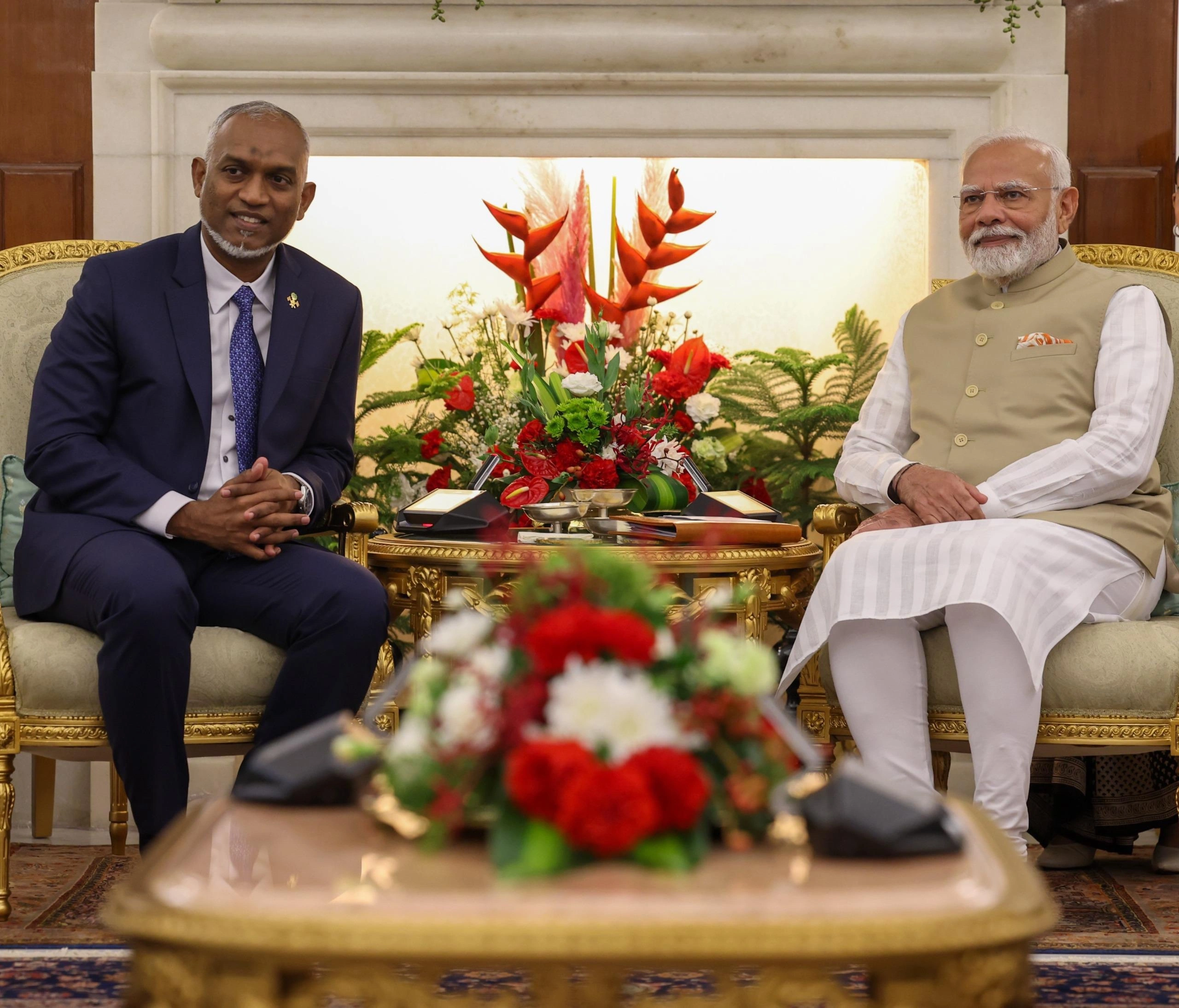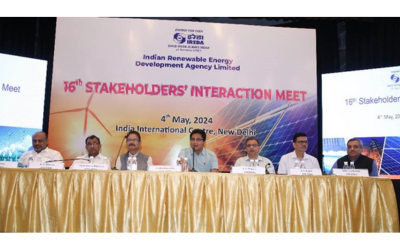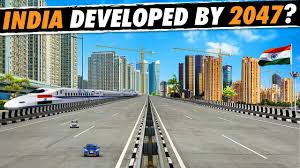On October 7, 2024, Prime Minister Narendra Modi of India and President Mohamed Muizzu of the Maldives met to thoroughly review their bilateral relations. They acknowledged the significant progress made in strengthening their historically close and special relationship, which has greatly benefited the people of both nations.
Prime Minister Modi emphasized on India and Maldives commitment towards its relationship under the ‘Neighbourhood First’ Policy and Vision SAGAR. He reaffirmed India’s dedication to supporting the Maldives’ development priorities. President Muizzu expressed gratitude for India’s timely financial assistance, including the extension of USD 100 million in T-bills by SBI in May and September 2024, which provided crucial financial support for the Maldives. He also recognized India’s role as the Maldives’ ‘First Responder’ during crises, such as the 2014 water crisis in Malé and the Covid-19 pandemic.
President Muizzu appreciated the Indian government’s decision to extend USD 400 million and INR 30 billion through a bilateral currency swap agreement, which has been vital in addressing the Maldives’ financial challenges. The leaders agreed to implement additional measures to support the Maldives in overcoming its financial difficulties.
Both leaders agreed that it was an opportune moment to establish a new framework for cooperation, aiming to transform their bilateral relationship into a Comprehensive Economic and Maritime Security Partnership. This partnership will be people-centric, future-oriented, and serve as a pillar of stability in the Indian Ocean Region. In this context, they decided on the following actions:
I. Political Exchanges
To enhance leadership and ministerial exchanges, both nations will include Parliamentarians and local government representatives in their interactions. Recognizing the role of shared democratic values in strengthening bilateral ties, they will finalize a Memorandum of Understanding to institutionalize cooperation between their Parliaments.
II. Development Cooperation
Building on the success of ongoing developmental projects, which have significantly benefited the Maldivian people, both sides agreed to:
- Collaborate on development projects tailored to the Maldives’ needs, including ports, airports, housing, hospitals, road networks, sports facilities, schools, and water and sewerage systems.
- Address housing challenges and expedite social housing projects with Indian support.
- Fully support the timely completion of the Greater Malé Connectivity Project (GMCP) and conduct a feasibility study to extend connectivity to Thilafushi and Giraavaru islands.
- Develop a state-of-the-art commercial port at Thilafushi to decongest Malé port and enhance cargo handling capacity.
- Explore collaboration on transshipment facilities and bunkering services as part of the Maldives Economic Gateway project at Ihavandhippolhu and Gaadhoo islands.
- Maximize the potential of Hanimaadhoo and Gan airports, developed with Indian assistance, and other Maldivian airports by strengthening air connectivity, attracting investments, and improving airport management.
- Establish an “Agriculture Economic Zone” and tourism investments in Haa Dhaalu atoll, and a fish processing and canning facility in Haa Alifu atoll with Indian assistance.
- Expand the successful High Impact Community Development Projects with additional financing to extend the India-Maldives people-centric development partnership across the Maldives.
III. Trade and Economic Cooperation
Recognizing the untapped potential for bilateral trade and investment, both sides agreed to:
- Initiate discussions on a Bilateral Free Trade Agreement focusing on trade in goods and services.
- Implement the settlement of trade transactions in local currencies to deepen trade linkages and reduce dependency on foreign currencies.
- Promote bilateral investments and closer engagement between business chambers and entities, disseminating information on investment opportunities and improving the ease of doing business.
- Support the Maldives’ efforts to diversify its economy by enhancing cooperation in agriculture, fisheries, oceanography, and the blue economy, including through academic linkages and expanded research and development cooperation.
- Boost tourism between the two countries through marketing campaigns and collaborative efforts.
IV. Digital and Financial Cooperation
Recognizing the transformative impact of digital and financial advancements on governance and service delivery, both sides agreed to:
- Share expertise in implementing digital and financial services.
- Cooperate on Digital Public Infrastructure (DPI) initiatives, including the launch of India’s Unified Payments Interface (UPI), Unique Digital Identity, Gati Shakti Scheme, and other digital services to enhance e-governance and service delivery for the benefit of the Maldivian people.
- Following the successful launch of the RuPay card in the Maldives, which facilitates payments for Indian tourists, work closely to extend similar services for Maldivian nationals visiting India.
V. Energy Cooperation
Acknowledging the importance of energy security for sustainable development, both sides agreed to:
- Explore cooperation in implementing solar power, renewable energy, and energy efficiency projects to reduce energy costs and help the Maldives achieve its NDC Goals. This will include establishing a framework for institutional partnerships involving training, exchange visits, joint research, technical projects, and investment promotion.
- Conduct a feasibility study to identify measures enabling the Maldives to participate in the One Sun One World One Grid initiative.
VI. Health Cooperation
Both sides agreed to:
- Deepen ongoing health cooperation by providing safe, quality, and affordable healthcare to Maldivians in India, promoting linkages between Indian hospitals and Maldivian facilities, and improving access to essential health services to strengthen healthcare infrastructure in the Maldives.
- Work towards the recognition of the Indian pharmacopoeia by the Maldivian government, followed by the establishment of India-Maldives Jan Aushadhi Kendras across the Maldives to provide affordable and quality generic medicines from India.
- Collaborate to improve mental health services and support systems at central and regional levels in the Maldives.
- Enhance healthcare professionals’ skills and knowledge through training programs.
- Jointly undertake health research initiatives to address common health challenges, including cancer and infertility.
- Share expertise on drug de-addiction and rehabilitation measures and assist in setting up rehabilitation centers in the Maldives.
- Enhance the Maldives’ capacity to conduct emergency medical evacuations.
VII. Defence & Security Cooperation
India and the Maldives face shared challenges in the Indian Ocean Region, impacting both nations’ security and development. As natural partners, they are committed to advancing maritime and security cooperation for the benefit of their peoples and the broader region.
The Maldives, with its extensive Exclusive Economic Zone, encounters various maritime challenges such as piracy, illegal fishing, drug smuggling, and terrorism. India, as a trusted partner, will collaborate closely with the Maldives to share expertise, enhance capabilities, and undertake joint measures based on the Maldives’ needs. The ongoing Maldives National Defence Force (MNDF) ‘Ekatha’ harbour project at Uthuru Thila Falhu (UTF), supported by India, will significantly boost MNDF’s operational capabilities, with both sides agreeing to ensure its timely completion.
The two countries also agreed to:
- Provision Defence Platforms and Assets: Support the Maldives by providing defence platforms and assets to enhance MNDF’s capabilities and meet the country’s maritime and security needs.
- Enhance Surveillance and Monitoring: Improve MNDF’s surveillance and monitoring capabilities with radar systems and other equipment.
- Support Hydrographic Matters: Assist the Maldives in hydrographic matters through capacity building and training.
- Strengthen Disaster Response Cooperation: Enhance cooperation in disaster response and risk mitigation by developing SOPs and conducting joint exercises.
- Information Sharing: Develop capabilities for information sharing through infrastructure, training, and best practices.
- Inaugurate Defence Ministry Building: Open the new Maldivian Ministry of Defence building in Malé, constructed with India’s assistance, to enhance the Ministry’s infrastructure.
- Increase Training Slots: Expand capacity building and training slots for MNDF, Maldives Police Services, and other security organizations under the ITEC programmes and other customized training programmes in India.
- Financial Assistance for MNDF Infrastructure: Provide financial assistance to develop and upgrade MNDF infrastructure.
VIII. Capacity Building and Training
The two sides reviewed ongoing capacity building initiatives that have positively impacted the Maldives’ human resource development and agreed to expand support for training and capacity building based on the Maldives’ needs and priorities. They also agreed to:
- Customized Training Programmes: Continue customized training programmes for Maldivian civil servants and local government representatives.
- Women-led Development Programme: Launch a new programme to promote women-led development by providing skills training and support to Maldivian women entrepreneurs.
- Start-up Incubator-Accelerator: Collaborate on establishing a Start-up Incubator-Accelerator in the Maldives to harness the innovation potential of the youth.
IX. People-to-People Linkages
People-to-people linkages are the foundation of the special ties between India and the Maldives. Both sides agreed to deepen these connections by:
- Establishing Consulates: Working towards establishing a Maldivian consulate in Bengaluru and an Indian consulate in Addu City to expand trade, economic cooperation, and people-to-people contacts.
- Enhancing Connectivity: Improving air and maritime connectivity to facilitate travel, support economic engagement, and promote tourism.
X. Cooperation at Regional and Multilateral Fora
India and the Maldives have significantly benefited from their close cooperation in regional and international forums, amplifying their voices on issues of mutual interest. As founding members of the Colombo Security Conclave (CSC), both nations recently reaffirmed their commitment to advancing common maritime and security interests, aiming for a safe, secure, and peaceful Indian Ocean Region. They also agreed to continue their collaboration in multilateral forums.
The leaders instructed officials from both countries to implement the outlined areas of cooperation efficiently and promptly. This initiative aims to strengthen the Comprehensive Economic and Maritime Security Partnership for the benefit of the peoples of both India and the Maldives, as well as the broader Indian Ocean Region. To oversee the progress of this vision document, a new High-Level Core Group will be constituted, with its leadership mutually decided by both sides.
I am delighted to welcome President Dr. Mohamed Muizzu to India. During our talks today, we discussed ways to improve economic linkages, connectivity, cultural connect and also cooperation in sectors like climate change, water resources, agriculture, fisheries and more.@MMuizzu pic.twitter.com/8uz2Buu82E
— Narendra Modi (@narendramodi) October 7, 2024



